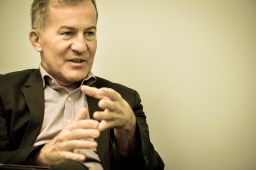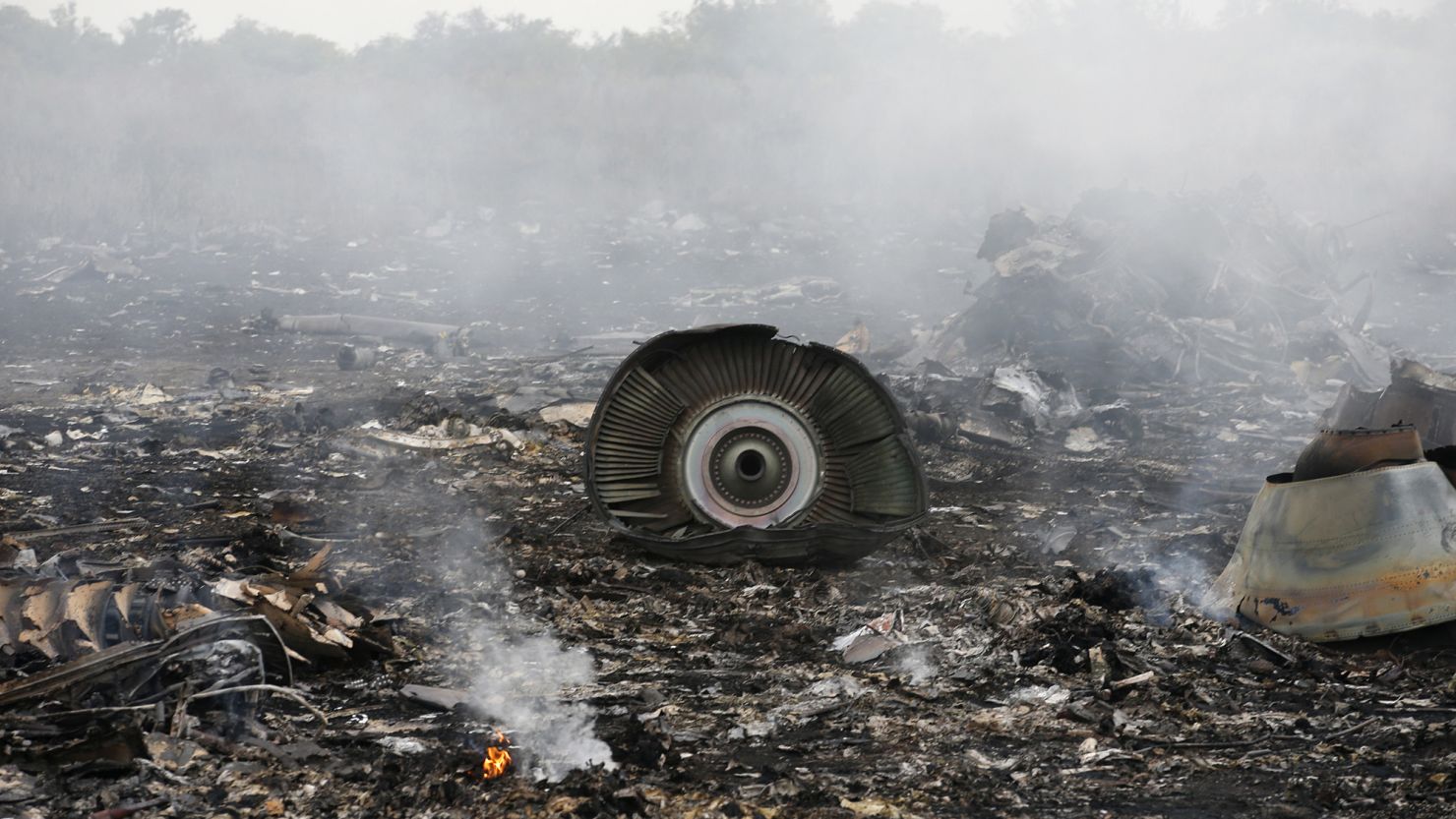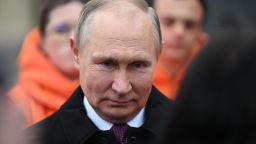Editor’s Note: Michael Bociurkiw (@WorldAffairsPro) is a global affairs analyst. He is a senior fellow at the Atlantic Council and was a spokesperson for the Organization for Security and Cooperation in Europe in Ukraine when MH17 was shot down. He is a regular contributor to CNN Opinion. The opinions expressed in this commentary are his own. View more opinion at CNN.
On July 17, 2014, several weeks after “little green men” had started to occupy Donetsk in eastern Ukraine, I rushed into the management offices of the Organization for Security and Cooperation in Europe, located in Kyiv, as word spread over social media that the unthinkable had happened.

A passenger plane – Malaysia Airlines flight MH17 – enroute from Amsterdam to Kuala Lumpur had been shot down over the territory controlled by Russian-backed separatists.
As the OSCE’s spokesperson in Ukraine at the time, I quickly realized that because we were the only international entity with access to the area, we would soon be tasked with rushing to the crash site – and reporting to the world what was transpiring.
As the awful scale of the disaster dawned on us, one of the senior members of the team said to me: “That’s it, the Americans will come in.”
Of course, that never happened. In fact, the Western response was so weak that the occupation that started in 2014 with Crimea was followed by Luhansk and Donetsk, and earlier this year extended into a full-scale invasion of Ukraine.
A hollow victory
On Thursday, in a Dutch courtroom, judges ruled that three of the four suspects charged with downing MH17 – Igor Girkin, Leonid Kharchenko and Sergey Dubinsky – were guilty of murder and sentenced them to life imprisonment. The families of the victims were also awarded damages exceeding $16.5 million.
A fourth suspect, Oleg Pulatov, was acquitted. All four refused to attend the trial, and were tried in absentia.
In delivering its judgment, the panel of judges noted that the three men’s actions were “severe” and their attitude “detestable.” Presiding judge Hendrik Steenhuis added that the firing of the missile was a premeditated act. Even if those involved believed it was a military plane, it would have been “crystal clear” no one would have survived, he said.
It’s unlikely the two Russians and one Ukrainian will ever spend a day behind bars (all are believed to be in Russia or in Russian-controlled territory). Moscow called the verdict “politically motivated,” adding that it would not extradite the three men to the Netherlands.
Still, relatives of the victims – some of whom have no remains and others only bone fragments of their loved ones – have told me that the sentencing will bring them one step closer to some sort of closure.
Jordan Withers, who lost his uncle, Glenn Thomas, in the crash, told me: “We respect the Dutch courts and their findings and I am extremely grateful for the truth they have provided to us today.
“But tomorrow there will still be a place missing at the dinner table, whether that be a son, daughter, mother, father, brother or sister,” he added.
Another British relative, Joanna Anderson, who lost her husband Stephen, told me the ruling feels like a hollow victory. “It doesn’t bring our loved ones back,” she said.
The biggest crime scene in the world
When our OSCE team arrived at the crash site, we found a surreal scene of smoldering wreckage and bodies strewn over a 35 square kilometer area. It was controlled by a small group of rebels who showed no remorse over what had just happened – rather, alcohol-fueled attempts at intimidation.
One of the Russian fighters in charge, nicknamed “Grumpy,” even posed for photographers hoisting a dead child’s toy animal. (Eighty children, including three infants, were on board MH17).
With no perimeter security, I described it at the time as the biggest open crime scene in the world. Even to this day, it remains inaccessible, due to its location in an area controlled by Russia.
In the long days of combing through fields of wheat and sunflowers, we found body parts, wreckage of the 17-year-old Boeing 777, passports and luggage. (One day, while escorting a Malaysian Airlines team around the crash site, one of the engineers told me of the odd numerology associated with the plane: MH17 crashed on July 17, which coincided to the day of its 17th year of entry into service. In other words, its 17th birthday).
Our main task was to report to the world what we saw and to facilitate access for investigators – often accomplished during late night negotiations with rebel leaders.
The meticulous work of the Dutch-led investigation team was exemplary: under dangerous and challenging conditions, they managed to retrieve hundreds of pieces of wreckage and transport them back to the Netherlands for re-assembly.
Investigators noted, as did we, that the forward part of the airplane fuselage was pockmarked with unique bow-tie-shaped marks caused by shrapnel that could have only come from an explosive device. They later concluded beyond a doubt that a Russian-supplied Buk missile that had been transported from Russia into that occupied region of Ukraine was responsible for the crash.
How prosecutors gathered the evidence
Delivered during full-blown, Russian-initiated hostilities in Ukraine, the MH17 verdict marks the first major international court ruling implicating the Russian Federation in mass murder. This could have an over-arching impact on Russia’s actions in Ukraine. After the March 2022 bombing of the theater in Mariupol, the MH17 downing represents the single biggest loss of human life in Ukraine since hostilities started more than eight years ago.
Legal experts have told me previously that ongoing civil suits related to MH17, if successful, could make Moscow liable for huge compensation claims filed by the relatives – which in turn could lead to seizure of Russian assets overseas.
The Dutch deserve plenty of credit, for not only collecting valuable evidence, but also poring over hundreds of hours of intercepted mobile phone calls between rebel leaders and Russian military officials.
In what can best be described as unusual but credible evidence-gathering, they managed to interview eyewitnesses under the guarantee of anonymity – statements which the court ruled as admissible given the extraordinary circumstances. Triangulation of cell phone tower transmissions, radar and satellite images, social media posts, examination of open-source data, as well as video footage and photographs all helped the prosecution’s case.
The MH17 investigation and trial is by no means finished. Work continues on collecting evidence and identifying other suspects.
Russia on trial
As should the work on fixing an aviation system that is so ill-suited to breaking news developments and conflicts that it places passengers’ lives at risk. If proper guidelines for pilots were put into place after the tragic crash of MH17, it’s possible that Ukrainian Airlines International PS752 wouldn’t have taken off from the international airport in Tehran in January 2020 to be shot down by the Iranians, killing 176 on board.
Indeed, why the air space over eastern Poland and eastern Moldova – where missiles have recently entered – hasn’t been closed boggles the mind.
Even though only three of four suspects were convicted Thursday – and even though people higher up the command chain that gave the OK to send the Buk missile launcher to Ukraine and allow one of its missiles to be fired remain at large – I do hope that the grieving relatives of the MH17 passengers will have come one step closer to closure from this horrible tragedy.
As noted in the court proceedings, many have endured psychological difficulties, as well as disruption in their personal and business relationships.
One thing is clear: Western allies need to significantly up their military support of Ukraine so that it can finally push Russia out of range of spreading terror far beyond its territory.
Like the two people in Poland who died from what is thought to be a Ukrainian defensive missile on Tuesday, or the two Brits who fell sick in July 2018 from a Russian murder attempt using a powerful nerve agent, the passengers and crew of MH17 had nothing to do with the conflict initiated by Russia.
The worst outcome from the judgment on Thursday would be if the Russian government comes away from the acquittal of one of their own with a sense of impunity – one that allows it to treat innocent civilians as collateral damage in its contemptuous assault against the rules-based international order.


